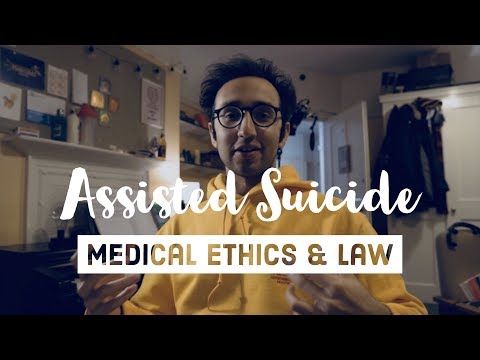Assisted Death and Medical Ethics: What You Need to Know
Contents [show]
In recent years, the issue of assisted death has become increasingly prevalent in the medical world. Here, we’ll take a look at what assisted death is, the ethical considerations involved, and what you need to know if you’re facing this decision.
Checkout this video:
What is assisted death?
Assisted death, also known as physician-assisted suicide or mercy killing, is a controversial topic in medical ethics. It refers to the act of a physician intentionally causing the death of a terminally ill patient at their request.
This practice is legal in some parts of the world, such as Switzerland, Belgium, and the Netherlands. In most other places, it is illegal and considered a form of murder.
There are many ethical considerations surrounding assisted death. Proponents argue that it is a compassionate act that allows people to die with dignity. Opponents argue that it is a form of murder and that it undermines the doctor-patient relationship.
The debate surrounding assisted death is complex and emotional. It raises important questions about the sanctity of life, the role of physicians, and our society’s attitudes towards death and dying.
The ethical debate around assisted death
The ethical debate around assisted death is one that has been ongoing for many years. The main question at the center of this debate is whether or not it is ethically permissible for a doctor to help a patient end their life. There are two main sides to this debate, with those in favor of assisted death arguing that it can be a humane and compassionate way to end a terminally ill person’s suffering. Those against assisted death argue that it is a violation of the Hippocratic Oath, which states that doctors should do no harm.
The debate around assisted death is one that is likely to continue for many years to come. However, it is important to be informed about both sides of the argument before forming your own opinion.
The legal landscape of assisted death
In recent years, the issue of assisted death has come to the forefront of public debate in many countries around the world. While there is no single definition of assisted death, it generally refers to the act of intentionally aiding someone in taking their own life, usually with the provision of lethal drugs.
Although assisted death is still illegal in most jurisdictions, a growing number of countries have begun to consider changing their laws on the matter. In 2015, Canada became the first country in the world to legalize medically-assisted dying and a number of other countries, including Belgium, Luxembourg, and the Netherlands, have since followed suit.
Meanwhile, in the United States the issue remains highly contentious. In June 2017, a bill that would have legalized medically-assisted dying in California was narrowly defeated in the state legislature. However, other states, such as Oregon and Washington, have already passed laws legalizing assisted death.
The legal landscape surrounding assisted death is complex and ever-changing. With such a polarizing issue at stake, it is crucial that everyone understands the arguments on both sides before forming their own opinion.
The medical perspective on assisted death
In recent years, there has been an increased public debate surrounding the ethical implications of assisted death. While there is no one clear answer to the question of whether or not assisted death is morally permissible, there are a number of different perspectives that can be considered.
From a medical perspective, assisted death raises a number of ethical concerns. First and foremost amongst these is the concern that assisting someone to die could be seen as abandoning them in their time of need. Additionally, there are worries that assisting someone to die could be used as a way to pressure vulnerable people into ending their lives, rather than providing them with the care and support they need to live.
Another major concern from a medical perspective is that assisted death could lead to a decline in the quality of end-of-life care. If people believe that they can simply end their lives when they become too ill or too old, then there may be less incentive to provide high-quality palliative care. This could have a negative impact on both individuals and society as a whole.
At the same time, it is important to recognise that there are also some potential benefits associated with assisted death. For example, it could provide individuals with greater control over their own death, and allow them to die with dignity. Additionally, it could provide relief from suffering for both the individual and their loved ones.
Ultimately, whether or not assisted death is ethically permissible is a complex question that does not have a simple answer. There are a number of different factors that need to be considered, and each person will have their own individual view on the matter.
The religious perspective on assisted death
When discussions about medical ethics come up, the topic of assisted death is usually not far behind. Assisted death is a complex and controversial issue, and there are a variety of religious perspectives on the matter.
The Roman Catholic Church is opposed to assisted death in all forms. They believe that all life is precious and should be protected from beginning to end. They also teach that suicide is a grave sin.
Certain Protestant denominations take a more permissive view on assisted death, believing that it is a matter of personal conscience. However, most Protestant churches still teach that suicide is wrong and discourage their members from pursuing it.
The Jewish tradition has a long history of valuing life, but there is some debate on the matter of assisted death. Some believe that it is permissible in certain circumstances, such as when the suffering is great and there is no hope for recovery. Others believe that any form of assisted death is wrong.
The Islamic tradition also values life highly, but there is some disagreement on the issue of assisted death. Some scholars believe that it is permissible in cases of great suffering, while others believe that it should only be allowed if the person requesting it is terminally ill and there is no hope for recovery.
Whatever your personal beliefs may be, it’s important to remember that this is a complex issue with many different perspectives. If you are facing a decision about assisted death, be sure to consult with your clergy or other religious leaders to get guidance on what they believe would be best for you.
The personal perspective on assisted death
There is no one easy answer to the question of whether or not assisted death should be legalized. It is a personal and ethical question that people must answer for themselves. There are a variety of perspectives on this issue, and there is no one right or wrong answer.
proponents of assisted death argue that it is a compassionate way to allow people to die with dignity, control their own medical care and avoid prolonged suffering. Opponents argue that assisted death is ethically problematic because it could be used to hasten death for non-medical reasons, such as financial gain or convenience.
ultimately, the decision of whether or not to support assisted death is a personal one. People must weigh the ethical implications of the issue and decide what they believe is right for themselves and for society as a whole.
The pros and cons of assisted death
Assisted death is a contentious issue in medical ethics. Proponents argue that it is a humane way to end the suffering of terminally ill patients, while opponents contend that it devalues human life and could be open to abuse.
There are a number of arguments for and against assisted death. Some of the key points are outlined below.
Arguments in favor of assisted death:
-It is a humane way to end the suffering of terminally ill patients.
-Patients have the right to die with dignity.
-Assisted death can be less painful than other methods of hastening death, such as suicide.
Arguments against assisted death:
-It devalues human life.
-It could be open to abuse, with healthy people choosing to end their lives for non-medical reasons.
-It is unnecessary when pain can be effectively managed with palliative care.
The impact of assisted death on society
The Assisted Death and Medical Ethics: What You Need to Know report is an exploration of the ethical, social and medical considerations surrounding assisted death. It is not a definitive guide, but rather a starting point for discussion.
This report will consider the following key topics:
– The definition of assisted death and its legal status
– The ethical considerations surrounding assisted death
– The impact of assisted death on society
– The medical considerations surrounding assisted death
– The religious considerations surrounding assisted death
The future of assisted death
The future of assisted death is shrouded in uncertainty. Although it is legal in some countries, there is no consensus on whether it should be allowed. The debate often pits the autonomy of the individual against the duty of the state to protect life.
Those who support assisted death argue that it is a way to respect the autonomy of terminally ill patients. They say that patients should be able to make their own decisions about their end-of-life care, and that assisted death should be an option for those who do not want to prolong their suffering.
Opponents of assisted death argue that it is a slippery slope that could lead to non-voluntary euthanasia, where people are killed without their consent. They say that Medical professionals have a duty to protect life, and that assisting in a death goes against this principle.
The issue is further complicated by the fact that there is no consensus on what qualifies as a terminal illness. Some people argue that only those who are facing imminent death should be eligible for assisted death, while others believe that those with incurable, degenerative diseases should also be able to choose to end their lives.
There is also disagreement on whether medical professionals should be required to participate in assisted deaths. Some people believe that participation should be voluntary, while others argue that it should be mandatory for all medical professionals, regardless of their personal beliefs.
As the debate continues, it is clear that there is no easy answer. The future of assisted death will likely continue to be debated for many years to come.
Assisted death and you – what you need to know
In recent years, the topic of assisted death has become more widely discussed and accepted in society. Assisted death is when a medical professional provides the means (usually through prescription medication) for a terminally ill patient to end their life.
There are many ethical considerations surrounding assisted death, such as whether it should be legalized, who should be allowed to receive assistance, and under what circumstances. These conversations are often complex and emotional, with different people holding strong opinions on the matter.
If you are considering assisted death for yourself or a loved one, it is important to be well-informed about the topic before making any decisions. Below is some basic information on assisted death, as well as some resources where you can learn more.
What is assisted death?
Assisted death is when a medical professional provides the means (usually through prescription medication) for a terminally ill patient to end their life. The patient must be of sound mind and request assistance themselves – families cannot request it on behalf of their loved ones.
Assisted death is legal in some countries and states, but not all. In jurisdictions where it is legal, there are usually strict rules and regulations surrounding who can receive assistance and under what circumstances.
What are the ethical considerations surrounding assisted death?
The ethical considerations surrounding assisted death are complex, and there is no one “right” answer. Different people will have different opinions on the matter, based on their personal values and beliefs.
Some common ethical considerations include:
-Should assisted death be legalized?
-Who should be allowed to receive assistance?
-Under what circumstances should someone be able to receive assistance?
-What safeguards should be in place to prevent abuse or misuse of the system?
-What are the implications of legalizing assisted death?







